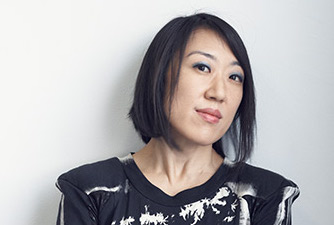In a recent New York Times profile, South Korean-born playwright Young Jean Lee emphasized, “Identity politics saved my life.” It’s what got her through coming of age in Pullman, Washington, a very small, very white, and often very racist community. It gave her a way to understand and communicate her place in the world. And it also influences and appears in much of her work, including her Broadway debut, “Straight White Men.”
The Anna D. Shapiro-directed tale of three brothers — all heterosexual, white, and male — explores privilege and the difficulties of coming to terms with it. On Christmas Eve, the brothers (played by Josh Charles, Armie Hammer, and Paul Schneider) hash out their realities, ideals, and how both were shaped by their upbringing by a mother who “was determined that her sons grow up without a sense of entitlement.”
With “Straight White Men,” Lee will be the first the first Asian-American woman with a play on Broadway. And, although it was first staged in 2014, the work’s themes are extremely resonant today: Increasingly, the identity politics divide is defined by those who believe in it, and those who don’t. And, as Lee sees it, both sides lack complexity and empathy.
“It’s like you’re good or you’re evil; you’re a queer woman of color or you’re some version of entitled privileged person,” Lee remarked. “I feel like compassion is very out right now. Curiosity is out. What’s in is condemnation and punishment. Now is not the moment for nuance; people do not want it.”
For her part, Lee — as a writer and a person — is more interested in the nuance. As The Times notes, she wrote her feelings about the popular “The Future Is Female” mantra via Facebook: “I don’t hope for a future in which our existing structures stay the same, but I am the one on top.”
She’s also intrigued about the ways people ignore or even forget their privilege. Addressing her Facebook friends who consider themselves Marxist, Socialist, and/or Communist, she wrote, “I’m always a little confused when people identify that way, especially if they are middle to upper class and involved with elite institutions. Does it mean you wish someone would take a bunch of your money away and redistribute it? That you are actively involved in organizing solidarity strikes? Is there any praxis required, or is it a label for an intellectual position? Not trying to be snarky, just trying to figure out if I’m a Marxist or not.”
Lee’s work exposes the disconnect between social justice in theory and in practice. While she was writing “Straight White Men,” she asked college students to voice their frustrations with straight white men, and their opinions on how straight white men should behave. “Everyone at the workshop was like: ‘I want a straight white man to sit down and shut up. I want him to take a back seat, to take a supporting role. I don’t want him to be aggressive,’” she recalled. “‘I want him to listen. I don’t want him taking the head role or the biggest job or to be going after the biggest stuff. I want him in a supporting role to me,'” she recalled.
However, when Lee put the criteria on the page, the workshop participants couldn’t stand “Straight White Men’s” characters. “I realized that the reason they hated him was — despite all their commitment to social justice — what they believed in most was not being a loser,” she said.
Lee’s previous plays include “Songs of the Dragons Flying to Heaven,” “Untitled Feminist Show,” “The Shipment,” “Pullman, WA,” and “Lear.” In 2003 she started Young Jean Lee’s Theater Company, which ran until 2016. Lee has received a Guggenheim Fellowship, a Prize in Literature from the American Academy of Arts and Letters, and two OBIE Awards.
“Straight White Men” opens tonight, July 23, at The Hayes Theater. It will run through September 9.







